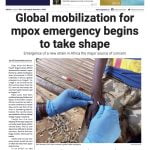This month marks the 20th anniversary of the so-called “World Conference Against Racism”, otherwise known as Durban I. The 2001 conference was to be a landmark event in the “struggle to eradicate all forms of racism”, according to United Nations organizers. Even the location of the gathering was meant to maximize symbolic value: Durban was a key base for South Africa’s anti-apartheid movement. But far from advancing human rights, the conference devolved into an orgy of antisemitic hatred.
At Durban I’s now-infamous NGO forum—intended as a platform for civil society groups to promote the conference’s agenda—vile antisemitic rallies were organized, attracting thousands. One widely distributed flyer showed a photograph of Hitler with the caption, “What if I had won? There would be NO Israel.” Accredited NGOs distributed booklets filled with antisemitic caricatures and copies of the notorious Protocols of the Elders of Zion. This was done even at a press conference called by Jewish groups expressing concern over the conference’s antisemitism.
It was not only the NGO forum that promoted racism while professing to combat it. At Durban I’s preliminary conference held in Tehran (of all places), the draft Durban Declaration condemned the “Zionist movement, which is based on race superiority” and accused Israel of implementing a “new kind of apartheid, a crime against humanity.” Naturally, the views of Jewish and Israeli NGOs were not welcome.
The final declaration adopted in Durban—a 62-page read-out of the conference—singled out only one country on Earth for censure. Not Iran, not North Korea, not the Taliban’s Afghanistan, from which Al Qaeda had already begun the operation to attack the United States three days later. Only Israel, a liberal democracy in the heart of an illiberal, undemocratic Middle East.
The antisemitic spectacle at Durban was witnessed with revulsion by Congressman Tom Lantos, the only Holocaust survivor ever to serve in Congress. “Having experienced the horrors of the Holocaust firsthand,” declared Lantos, “this was the most sickening and unabashed display of hate for Jews I had seen since the Nazi period.”
The Durban legacy remains powerfully relevant today. At the opening of the 21st Century, the conference promoted the so-called “new” antisemitism that targets the Jewish collective by demonizing and deligitimizing the State of Israel, slandering Zionism as a form of racism, and denying Jewish peoplehood. The “new” antisemitism fuses medieval blood libels with the contemporary language of social justice and anti-racism, and in so doing undermines the very essence of social justice and anti-racism.
The failure of the international community to condemn Durban I had very real consequences: Antisemitism was given a prestigious platform, and anti-Zionism and Israel hatred became accepted orthodoxy among certain academic schools and in large swaths of public discourse.
The anti-Israel Boycott, Divestment, and Sanctions (BDS) movement was borne out of Durban, and the harassment and discrimination to which Jewish university students have been subjected in many parts of the United States and Europe owes its prevalence to the depravity of Durban.
Remarkably, instead of condemning what Durban I became, the United Nations continues to celebrate the event by organizing successive commemorative conferences. Later this month, the UN plans to hold a high-level meeting in New York known as Durban IV, to honor the 20th anniversary of the original conference. This is a moral outrage, and it will surely compound the damage by further driving global antisemitic narratives.
I applaud President Joe Biden for leading the United States to boycott this obscenity. Across four administrations, both Democrat and Republican, the United States has refused to participate in Durban I or any of its follow-up iterations, including the one that is forthcoming. The US understands that Durban is about antisemitism, not anti-racism, and will not abide any form of hatred towards Jews.
President Emmanuel Macron of France similarly declared his country’s boycott of the Durban commemoration, as have the United Kingdom, Germany, the Netherlands, Austria, Hungary, the Czech Republic, Bulgaria, Australia, Canada, and of course, Israel. These countries are exhibiting moral leadership and are an example for the world.
All countries of goodwill must withdraw from Durban IV. With antisemitism rising across the world and attacks on Jews proliferating from Los Angeles to Berlin, the time has come for leaders of conscience to act in concert. On this matter, there is no room for neutrality. Participating in Durban IV is an endorsement of antisemitism. The time has come for all of us to say enough of the Durban depravity.







